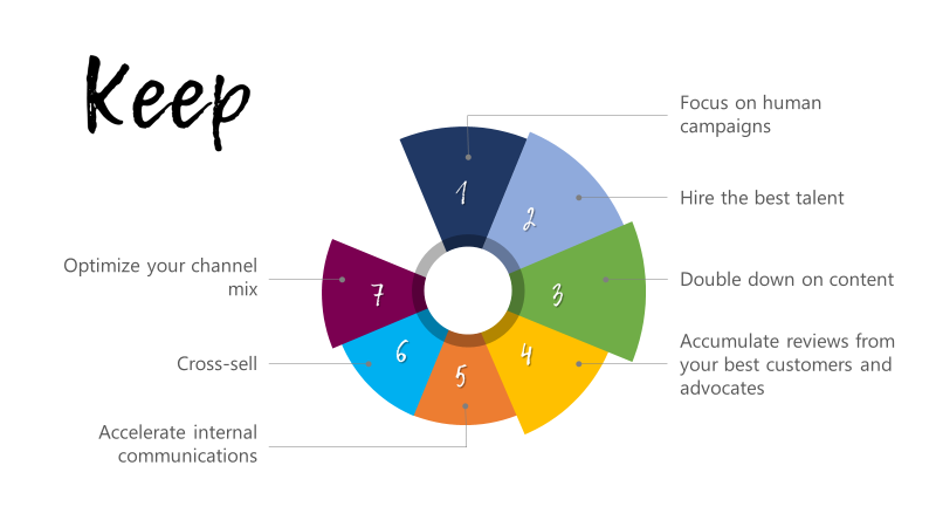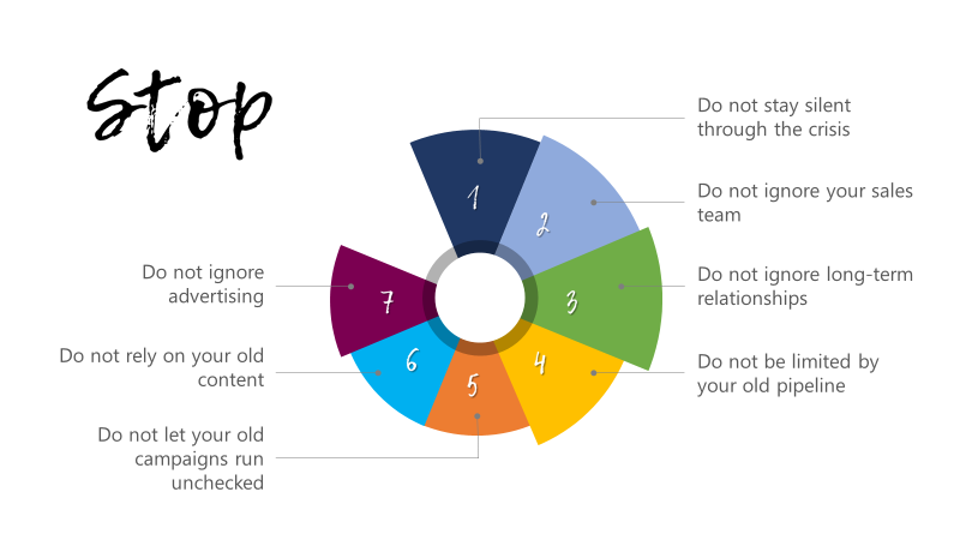Rife with uncertainty, recessions can sow chaos and panic, sometimes compelling companies to act in ways that are counterproductive to their long-term success. Whether it’s steep cuts to marketing budgets or a business-as-usual approach, companies that fail to deftly adapt to the new landscape, risk exacerbating revenue hardships long after the recession ends.
Despite the anxiety, the budget cuts, and the drop in demand for a broad cross-section of products and services, there are strategies marketers can embrace to maintain momentum even in the midst of the most severe economic climate and emerge stronger once the dust from the recession settles.
Whether that means incentivizing new direction and strategy, reassessing what isn’t working, or continuing what is, the future doesn’t need to seem directionless.
Seven Things B2B Companies Should Start Doing
1. Be proactive.
Forget what your title says you should do. Instead, focus on what must get done, and just do it. Adversity creates opportunities. If you see gaps in your operations, step in as the de facto COO, and fix those gaps. If you see issues with your employee relations, go ahead and address those too.
In short, be visible, take action, and help your CEO and your teams operate strategically and efficiently.
2. Take customer engagement to the next level
To nourish your most loyal customers, form customer councils tasked with generating new solutions or improving existing systems. While you’re at it, ask them what they need most from you. These councils will help you generate ideas and content that you can leverage to acquire more loyal customers.
3. Update your messaging.
Let’s face it, the audiences you used to sell to are no longer the same; and even if they are, their goals, priorities and timelines have changed. Their teams may also have changed if they’ve gone through layoffs or freezes. Finally, like you, they are looking for new audiences to sell to.
Figure out what changed and tweak your brand message to the new audiences.
4. Cleanse your data.
Take this time to clean up customer data. Deep dive into analytics to find places to optimize spend—so that when things pick up again, you’ll be ahead of the curve.
5. Search for new partners.
In recessions, as in war, alliances are crucial. Collaborate with other brands on products or solutions that may be beneficial to both of your customer segments. Build connections and integrations that address the needs engendered by the new environment—they will likely serve you even after the recession ends. By forming these partnerships, you are sharing data, expertise, and often the cost of acquiring new clients – which is a win-win for all involved partners.
6. Embrace philanthropy
Find nonprofit opportunities that fit your brand and message. Form partnerships with nonprofits and offer opportunities for your clients and employees to join you in support of a common cause. It’s good for business, and good for the nonprofits that need more help than ever.
7. Reenergize stakeholders with a sense of purpose
In the darkest times, leaders are called on to invoke a sense of purpose and positivity. Remind your customers that this, too, shall pass, and that you’ll be there for them when times get better, even if they have to walk away, pause or cancel their contracts now.
Stay in constant communication with your clients that walked away and employees you were forced to let go. Both are far more likely to return if they see you genuinely care for their well-being.
Seven things B2B companies should keep doing
1. Market like a human.
We do not build B2B or B2C connections; we build H2H—human to human—connections, as Bryan Kramer once said. It’s ok to sell, but now more than ever it’s important to put faces behind a brand. That means fewer faceless marketing campaigns and more personal interactions. Everyone on the team, up to and including the CMO and CEO, should aim to speak with a client or prospective client at least weekly.
2. Retain and expand talent.
This one is counterintuitive but vital. Continue to hire the best talent. Why is it that in times of stock market downturn, our natural inclination is to buy, while in times of HR downturn, we shrink our teams? The opposite should be true: now is the time to hire the most talented and loyal employees—budget permitting, of course.
Additionally, take a look at your existing talent and see where that talent can be better utilized. For example, in the current climate of canceled events, event planners are partnering with content marketers to launch digital campaigns. In many organizations, event planners are an underused content resource. Right now is the perfect time to cross-train and leverage these key players to promote your services.
3. Create new content.
Double down on content creation. Build new content pipelines and content consumption platforms. Fill your blog with interesting, up-to-date information written in a compelling voice that speaks to the new landscape.
Then, consider going the extra mile by compiling your most interesting content into a book.
4. Encourage reviews.
Reviews matter more than ever. Ask your most loyal customers to generate reviews on G2 and other platforms. Send customers gifts to incentivize publishing reviews, and promote your top reviews and the clients who wrote them across social media.
5. Communicate.
As uncertainty and fear proliferate, it’s imperative that you accelerate internal communications. Tell your teams how the company is doing—honestly and openly. Do not hide bad news, and be realistic—your people follow the news, and they will be turned off if they sense you’re sugarcoating reality. At the same time, don’t lose sight of positive developments, and most importantly, paint a view of a bright future. That’s what good leaders do in difficult times.
You can try instituting skip-level meetings so that every employee feels heard and valued, while you get valuable tidbits that may get lost in management discussions. You will turn your employees into brand ambassadors, who can create a holistic, positive, and energetic front for your prospective customers.
6. Cross-sell.
Generally, cross-selling is easier than new customer acquisition. To sustain demand for your solutions, cross-sell your best products to your best customers at a discount, or even with free short-term trials.
7. Reevaluate your investments.
Keep investing in lower-cost channels like SEO and content, while pausing less cost-effective or riskier channels. INFUSEmedia is seeing many clients double down on ABM and intentional marketing because these tactics are ideal for microtargeting prospects most likely to convert in times of economic uncertainty.
Seven things B2B companies should stop doing
1. Don’t be complacent.
It may be tempting to halt momentum during an economic downturn, conserve resources, and wait for the economy to turn around before launching new initiatives. This is a big mistake and a recipe for missing out on lucrative opportunities. Do not be silent. Do not take crisis communications mildly. Recession is an opportunity to emerge with original, interesting, and authentic content that your audience will enjoy and benefit from.
2. Don’t abandon your sales team.
Just because selling got harder, and marketing priorities have shifted, do not ignore your sales team. They still have quotas to meet, and they need marketing now more than ever. Reach out to sales and find ways to improve marketing and sales alignment—a best practice regardless of economic conditions.
3. Don’t assume it’s business-as-usual.
Do not expect the same pipeline, the same velocity, or the same returns. Nurturing will take longer and pipelines will extend. The upside is that you will now have plenty of opportunities to build deep and meaningful relationships that will last long after the recession is in the rearview mirror.
4. Don’t assume your pipeline is fixed.
As aggregate demand drops, and companies become more risk-averse, it might be tempting to limit your pipeline to the list of accounts you were nurturing before. This is a shortsighted approach. Recessions give a jolt to new prospective customers to start shopping for products and solutions, and as a result, you will find new customers. This is also why it’s imperative to reevaluate your brand message and align it with new audiences.
5. Disable old campaigns.
The campaigns that have been running on autopilot for months might be irrelevant, tone-deaf, or otherwise ineffectual during a recession. That’s why you shouldn’t let your old campaigns run as-is.
Pause existing campaigns, rewrite copy, and only re-start those campaigns that make sense in the new environment.
6. Don’t recycle old content.
If old campaigns are no longer useful, the same is true for old content. Do not rely on pre-recession content without first ensuring it’s still timely and valuable. Messages that resonated with your audience in the past may now sound tone-deaf. Comb through your assets and make sure the messaging is still relevant.
7. Don’t ignore advertising.
It’s not uncommon for businesses to cut back on advertising in uncertain times. But depending on your goals and strategy, pausing advertising might cost you big in the long run. Due to diminishing demand, advertising platforms are lowering costs, which means you can run ads—including programmatic and PPC—cheaper than ever before. And in a less “noisy” environment where many of your competitors have substantially pulled back on their advertising, you can make significant inroads in telling your story.
Closing Thoughts
Perhaps the best quote about marketing in a recession comes from Sam Walton, the founder of Walmart. When asked, “What do you think about a recession?” he responded, “I thought about it and decided not to participate.”
Recessions pose a litany of challenges for every business. Yet the biggest blunder marketers can make is to either continue business as usual or make deep cuts to marketing. Both are shortsighted reactions that lead to missed opportunities.
Strategic marketing demands that even in a recession, one maintains momentum so that when the economy rebounds, marketing apparatus and sales pipelines won’t atrophy from a lack of action, and the organization will emerge in a strong position to sell. The inherent versatility of marketing makes this a creative challenge that will, in the end, steer the ship of a bustling new world.
Want to learn more about recession marketing? Check out Victoria’s webinar with CMC Founder, Byron on WriterAccess: Recession Marketing Roadmap: The New GPS to Thrive
Victoria Albert joined INFUSEmedia as Vice President of Marketing in January 2020. Before INFUSEmedia, she served as Vice President of Marketing at Unidine/Compass Group North America, where she was instrumental in closing M&A and more than doubling company revenue in just two years. She has 20 years of experience in strategic marketing and program execution roles in financial services and healthcare industries, where her work was recognized with multiple nominations and awards. Victoria holds degrees from Boston University, Tufts University, and Yale University.





